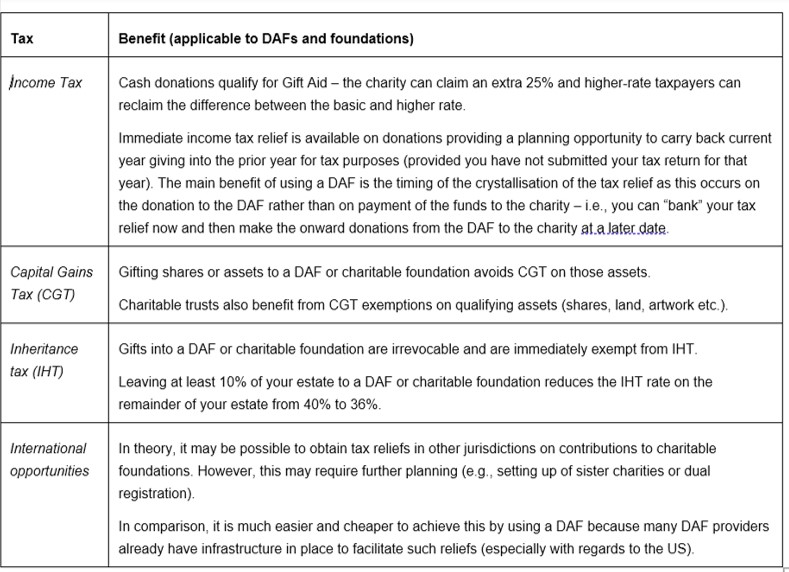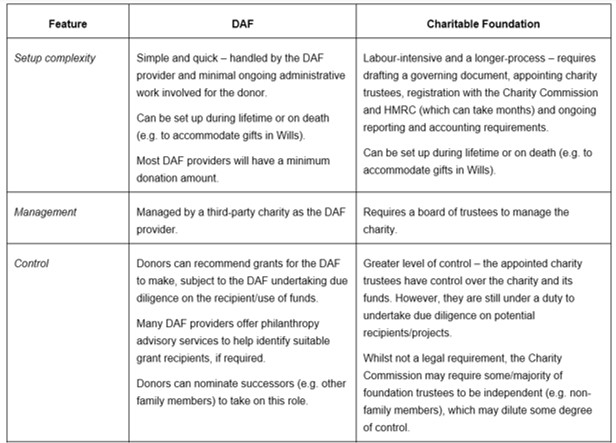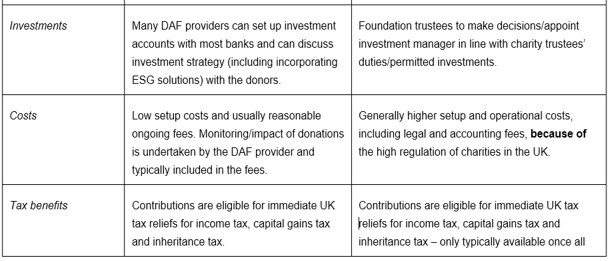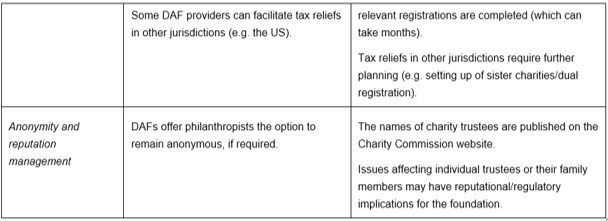Philanthropy
Choosing The Right Vehicle For Charitable Giving: Charitable Foundation Vs DAF

The authors of this article examine the differences, advantages and costs of two broadly different structures for philanthropy.
The following article from, Katya Vagner, a partner at law firm Fladgate, looks at how UK-based high net worth individuals choose between charitable foundations and donor-advised funds (DAFs) as part of their broader wealth and legacy planning.
DAFs, which are a large sector in the US (see a recent
article
here), are also developing in the UK. Vagner notes
that giving from DAFs is rising rapidly, driven by demand
for a flexible and simple approach. DAFs are, so their advocates
point out, protective of the donor’s anonymity – an important
feature when privacy is sometimes at risk. There are
practical and regulatory trade-offs between DAFs and foundations,
especially for individuals having to manage succession, estate
planning, or preparing for significant liquidity
events.
The editors of this news service are pleased to share these
ideas; the usual editorial disclaimers apply to views of guest
writers. Email tom.burroughes@wealthbriefing.com
and amanda.cheesley@clearviewpublishing.com
if you wish to comment and suggest ideas.
For individuals and companies wanting to make a lasting impact,
the instinct is often to set up a private charitable foundation.
These structures, typically charitable companies or trusts, are
designed to manage long-term giving. However, donor advised funds
(DAFs) are an increasingly popular alternative as a philanthropic
giving vehicle, with contributions to DAFs in 2023 reaching
£852.6 million and charitable assets under management in UK DAFs
totalling £2.8 billion (1).
A DAF is a dedicated account administered by a third-party
charity that allows donors to make contributions and recommend
grants to selected charitable causes. Donors can contribute a
variety of assets to the DAF, including cash, shares, property
and artwork.
Both options offer ways to support charitable causes and similar
tax benefits, but they differ in structure, administration, and
ongoing responsibilities – a distinction outlined in the table
below.
Key characteristics of DAFs vs Charitable
Foundations
Setup speed and administrative burden
DAFs can typically be established within days and, in urgent
cases, within hours. Conversely, setting up a charitable
foundation generally requires several months, especially if the
Charity Commission raises any queries as it is currently taking a
minimum of two months to respond to applications and
registrations. In many cases. it can take considerably
longer.
Another notable feature of DAFs is their flexibility in estate
planning. Donors can leave a portion of their estate to a DAF in
their will, even if they haven’t opened an account during their
lifetime. While it is possible to instruct executors to set up a
charity after death, this can significantly delay estate
administration.
Historically, setting up a charity was relatively
straightforward, leading to the creation of many charities.
However, many of these charities are now largely dormant, holding
only modest amounts of funds. As of 29 August 2025, there are
170,914 registered charities in the UK with 53,673 of these
charities in receipt of income of <£5,000 (2). Charity
trustees might consider winding up or consolidating these dormant
charities into a DAF, which requires significantly lower
administrative effort.
Control vs compliance
At first glance, charitable foundations appear to offer donors
greater influence over their giving than a DAF. Many assume that
anyone can serve as a charity trustee and that a private charity
staffed entirely by family members is sufficient. In practice,
while this is not a legal requirement, the Charity Commission
often insists on having independent trustees. For corporate
foundations, most trustees cannot be company directors or
employees. Independence and the ability to demonstrate that
trustees act in the charity’s best interests, rather than family
or business interests, is crucial. By contrast, there are no such
restrictions on who can hold a DAF account or give instructions
regarding it.
Private charity trustees may also be willing to take on a higher
degree of risk than DAFs, for instance, making donations
outside the UK. Some DAFs, however, have blanket restrictions on
certain regions. Foundations can offer more flexibility, allowing
trustees to make nuanced decisions based on circumstances and
opportunities, although they must still perform appropriate due
diligence – a key focus area for the Charity Commission.
Finally, donors often assume that investment decisions can only
be influenced if they have a private foundation. Many DAFs can
work with a donor’s preferred investment advisors and allow some
input on investment strategy. Account holders often also receive
regular investment statements and other key financial data.
Cost considerations
Setting up a charity used to be relatively inexpensive; however,
it is now rare that creating a private foundation is more
cost-effective than establishing a DAF. Organisations such as
Philanthropy Impact have produced comparisons of costs and
charges across a large range of DAF providers, and it is
relatively easy to access data regarding minimum account balances
and associated fees. Considering all aspects of the charity
creation and registration process, it becomes evident that opting
for a foundation is increasingly less likely to be the cheaper
option.
DAF providers have a range of pricing models and broadly
speaking, the more substantial the donations, the more
competitive the pricing becomes. While the ongoing platform costs
may seem an unnecessary expense, the difference in regulatory
responsibilities between private foundations and DAFs may help to
make those costs more palatable. Private foundations are subject
to rigorous compliance requirements, including annual filings to
the Charity Commission, adherence to specific governance
standards, and detailed reporting obligations. These regulations
can impose considerable administrative burdens on the charity
trustees.
In contrast, DAFs offer a more streamlined approach, with the
sponsoring organisation handling most of the regulatory
compliance and reporting duties. For busy donors, the relief from
administrative responsibilities often outweighs the ongoing fees.

Tax efficiency
Broadly speaking, UK DAFs and UK foundations provide the same tax
benefits to donors.
The key difference lies in the timing for obtaining those
reliefs. DAFs can be established and activated much more quickly
than charitable foundations, which is advantageous if making
donations within a specific tax year is crucial. This accelerated
setup process for DAFs ensures that donors can promptly achieve
their desired tax benefits, unlike the lengthier establishment
process for private foundations, which may delay potential tax
advantages.
Anonymity and reputation
Privacy is often a key concern for donors. DAFs allow
contributors to remain anonymous, keeping personal details and
donation amounts confidential. By contrast, the names of charity
trustees and charity accounts are publicly available on the
Charity Commission website, which might not be desirable for
those seeking privacy.
Reputation is another consideration. Private foundations can be vulnerable to scandals involving trustees, founders, or beneficiaries, potentially harming the foundation’s standing. DAFs, managing many accounts, rarely see a single incident affect the organisation’s overall reputation. Their distributed structure provides greater resilience against isolated issues.
Summary
Both DAFs and charitable foundations have merits, depending on a
donor’s goals and preferred level of involvement. Understanding
the legal, tax, and operational implications is key to choosing.



Footnotes
1, NPT UK ‘UK Donor-Advised Fund Report’, released
2024.
2, Charities by income band
The authors
Katya Vagner
Partner at Fladgate LLP

Katya Vagner is a solicitor and partner at Fladgate LLP. She
specialises in UK and offshore private client and charity legal
and tax matters and advising on complex cross-border issues.
Katya advises clients across the globe on issues such as: estate
and succession planning, setting up and advising on structures,
incapacity planning, administration of trusts and estates,
philanthropic strategies and a range of legal and tax issues. Her
clients include fiduciaries, charities, high net worth
individuals and their family offices. Katya has a particular
passion in helping clients implement philanthropic initiatives,
including advising on the structuring of UK and cross-border
charitable giving and governance matters.
Bethany Brand
Associate at Fladgate LLP

Bethany is an associate in the Private Client and Tax team at Fladgate LLP. She acts for both UK based and international clients, advising high net worth individuals, families and trustees on a broad range of estate planning and taxation matters. Bethany also advises clients on Charity law and philanthropy matters, including assisting charity trustees on constitutional and governance issues.
Zevi Wulwick
Associate at Fladgate LLP

Zevi is an associate in the Private Client and Tax team at Fladgate LLP. He advises HNW and UHNW clients on a range of matters including UK and international tax, succession and estate planning.